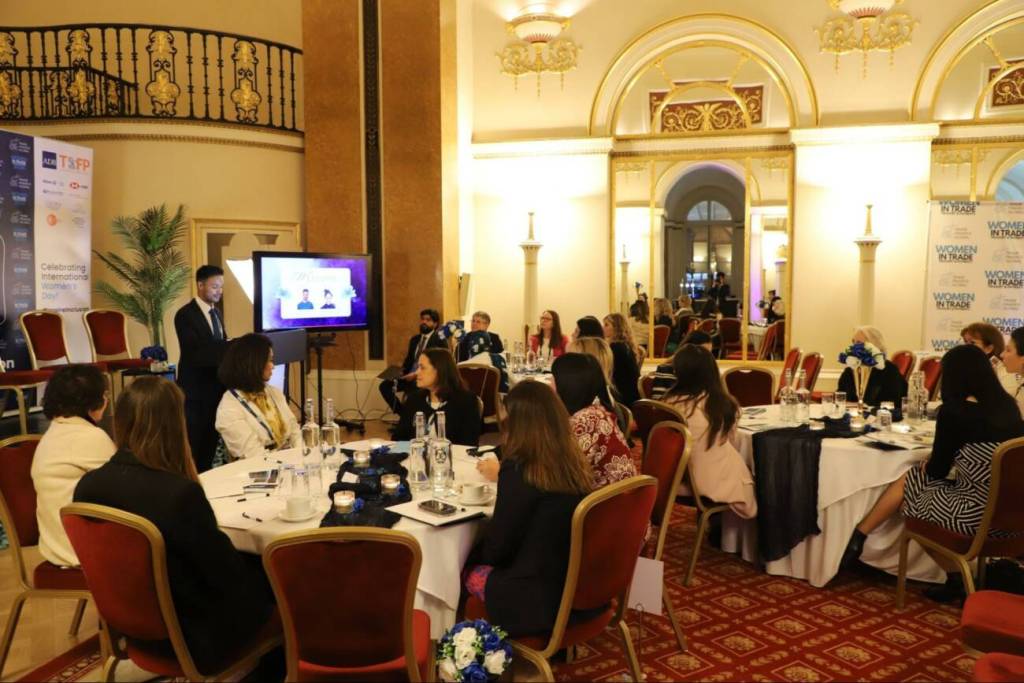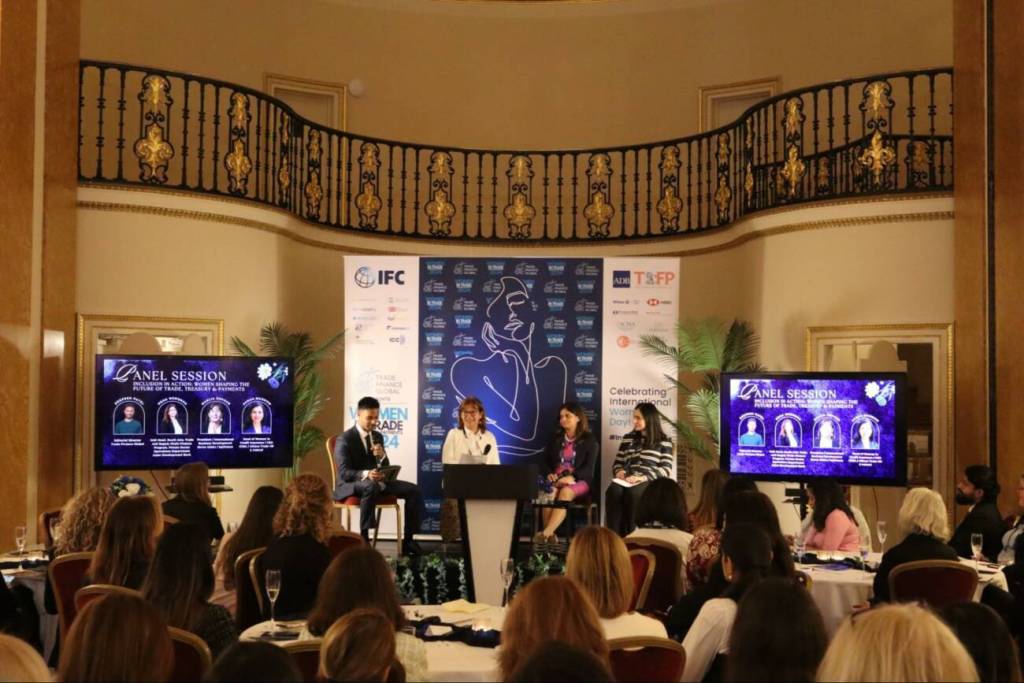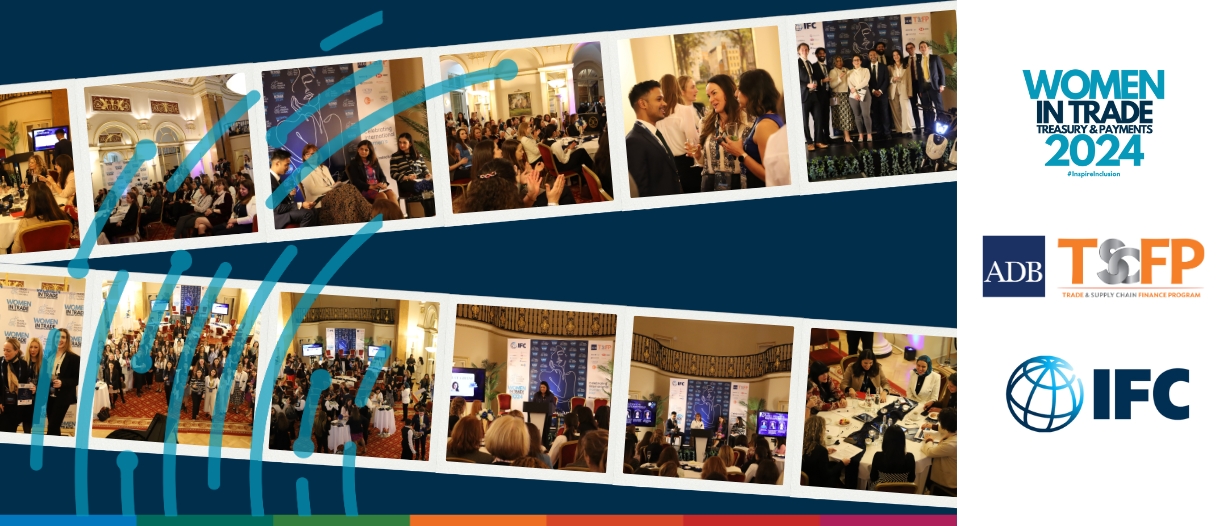Estimated reading time: 6 minutes
Trade Finance Global (TFG) held its annual Women in Trade, Treasury, and Payments event at the Lansdowne Club in London to celebrate International Women’s Day and the many remarkable women across the industry.
In a series of roundtable discussions at the event, held under Chatham House rules, many participants discussed their experiences of being a woman in the workplace. They discussed how to bridge the gender equality gap and make trade, treasury, and payments an inclusive industry for everyone.

Promoting gender equality in the workplace starts with early education
Promoting gender equality fundamentally begins with early education. It plays a critical role in shaping perceptions and breaking down gender stereotypes.
One speaker said, “I was raised in a family where there was no difference in gender. My father always told me there was nothing I could not do or achieve because I was a girl.”
Another added, “Education starts when you are very young in your family, with your parents saying, okay, you are a girl, but you can speak up.”
By incorporating gender equality at these earliest stages of life, children can be taught to appreciate and understand the importance of equality between men and women. This will address stereotypes and instil confidence in young girls, empowering them to pursue their interests and ambitions without the constraints of traditional gender roles.
This confidence is crucial for their continued success and participation in areas traditionally dominated by men, such as STEM fields or leadership positions.
Ultimately, as one participant said, “Education starts in the family, then in the school, then in university, and then in the industry.”
One of the powerful aspects of education in the industry is that it can come from influential mentors and role models.

Mentorship and role modeling
Mentorship and role modelling can have a transformative impact in shaping the next generation of female leaders. Mentorship is crucial for knowledge sharing, skill development, and confidence building among women navigating their careers in these sectors.
However, it’s not just mentoring in the traditional sense that can play a role in promoting equality in the industry; there is also a concept of reverse mentoring that some organisations are exploring.
Reverse mentoring involves a process where the traditional mentoring roles are inverted, meaning that younger or less experienced individuals mentor more senior or experienced staff. For instance, younger employees might share insights about new technologies, social media, or current trends with their more experienced counterparts.
Reverse mentoring can also take the form of junior members from historically marginalised groups mentoring senior leaders about their experiences and ways of working. This method can foster an inclusive culture that values different perspectives and skills, regardless of the traditional seniority-based mentoring paradigms.
Whether conducted in the traditional sense or under an inverted approach, mentoring in the workplace can be a powerful tool to promote equality in the trade, treasury, and payments space.

Inclusive leadership and decision-making
Closely related to mentoring, ensuring an organisation has an inclusive leadership team can help inspire emerging leaders, regardless of their demographic background.
Seeing women in leadership positions not only challenges the prevailing stereotypes and biases about gender roles within the industry but also demonstrates the possibilities for career progression and success. When women see themselves reflected in leadership positions, it fosters a sense of possibility and belonging that can catalyse ambition and drive.
However, leadership roles and decision-making processes remain heavily male-dominated in many industries.
One participant said, “My company is 43% women, but not at the leadership level. If I look at the company stats, it’s good, but it’s not good enough for me because I’m the only woman in the boardroom. Every single time, I’m the only one in the boardroom.”
It is time to do better.
By actively involving women in strategic discussions and policy formulations, organisations can ensure a more balanced representation that reflects the diversity of their workforce and customer base.
The emphasis on inclusive leadership is grounded in the understanding that diverse teams, led by individuals who value different viewpoints and experiences, are better adept at navigating the complexities of the global market.
Consequently, the commitment to inclusive leadership and decision-making strengthens an organisation’s competitive edge by harnessing human creativity and intelligence.
Another way to maximise employee potential is by building a corporate culture that embraces and encourages flexible working arrangements.
Flexible work arrangements
Ensuring flexible work arrangements is a strategy for promoting gender equality in the workplace, as they allow for a more inclusive environment that accommodates the diverse needs of every employee, not just parents.
One participant said, “The benefit of flexible work options is that when you give them to women, you give them to everyone. It doesn’t have to be that since I’m a mum, I need that flexibility. Someone may need the flexibility to look after ageing parents, and if that’s something offered institutionally, it can benefit everyone.”
By offering options such as remote work, flexible hours, and part-time positions, employers can support women and men in achieving a healthy work-life balance, enabling everyone to thrive professionally and personally.
This approach helps retain talented female professionals and ensures they do not have to choose between career advancement and their roles outside of work.
Trade Finance Global wants to thank all of our partners for helping make this Women in Trade, Treasury & Payments campaign possible. Additionally, we want to thank all of the roundtable, evening event and digital campaign participants for highlighting the amazing work that all women are doing in the trade, treasury & payments industry.
We want to ensure that the lessons we all took away from this evening are not forgotten, and we continue to build on this knowledge every day. From acknowledging different cultures and how they deal with gender issues to educating the next generation, there are endless ways that we can continue this momentum and make our industry more inclusive.
We want to challenge you, what can you do to help inspire inclusion?
Be on the lookout for TFG to continue to feature all of the amazing women in trade, treasury & payments throughout the year!





























